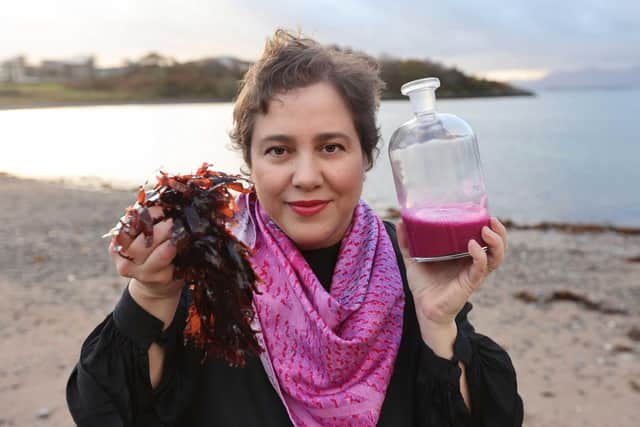A Scottish start-up is creating eco-friendly dyes from seaweed – available in every colour but always green
Seaweed may seem unremarkable, natural flotsam washed up on the tide that you just step over and give little further thought.
But it is something of an unsung hero, hiding its light under a bushel.
Advertisement
Hide AdAdvertisement
Hide AdNot only does it clean water, provide food and shelter for marine creatures and lock up climate-warming carbon, it has dozens of additional uses.
It is used to produce human foods like ice-cream, as well as cosmetics, fertilisers and industrial gums and chemicals.
And now an innovative Scottish biotech start-up is developing a new purpose for the plants, extracting pigments to make eco-friendly natural dyes that could help the fashion industry become more sustainable – available in a full spectrum of colours, but always green.
The company, SeaDyes, was set up last year on the back of a research project between the Oban-based Scottish Association for Marine Science (Sams) and marine scientist Jessica Giannotti, who runs the local Crùbag textile studio.


“For the past decade I have been combining art and science to create textiles and designs that celebrate and communicate the wonder of the ocean, seeking to use the most sustainable methods for production,” Ms Giannotti said.
“With SeaDyes we are taking that one step further, using seaweed to create a rainbow of vibrant colours that can be used by the fashion and textiles sector at large.
“With consumers today demanding higher ethical standards, the natural dyes market is rapidly expanding and driving innovation.
“Seaweed is a great raw material resource as it stores carbon, cleans water and is globally abundant.
Advertisement
Hide AdAdvertisement
Hide Ad“We are offering a sustainable bio-based alternative to synthetic dyes, and we are working towards developing the technology on an industrial scale.”
Initial experiments have focused on a bright magenta colour, extracted from the red seaweed dulce, with the dye already tested on a range of natural fibres – including cellulose, cotton blends and wool – to assess its performance.
The team hopes to expand the technology to include a full spectrum of colours that can be applied to multiple types of fabrics and other base materials.
The natural dyes could potentially also be used as a colourant for other products and in other sectors in the future.
Synthetic dyes are typically created using fossil fuels, contributing to global pollution and climate change.
SeaDyes also has the potential to support a more circular fashion industry.
Garments made with seaweed-based dyes and natural fabrics can be biodegradable and have a much lower impact on the environment when they reach the end of their life cycle.
SeaDyes was one of the first start-ups to take part in the Industrial Biotechnology Innovation Centre’s (IBioIC) Biotech Innovators accelerator programme in 2023, supporting the business with critical growth activities such as strategy development, pitching for investment and marketing plans.
Advertisement
Hide AdAdvertisement
Hide AdIts founders are also working with the innovation centre to explore how SeaDyes’ technology can be applied on an industrial scale.
Future plans include assessing how co-products of the dye extraction process could be repurposed by other sectors, rather than seaweed biomass going to waste.
Liz Fletcher, director of business engagement at IBioIC, added: “Startups like SeaDyes, which are using biotechnology to make a difference in key industries, are hugely important for Scotland and the UK’s net zero transition and the development of a greener economy.
“There are so many bio-based options to be explored that could replace petrochemical-derived products we use on a daily basis.
“Our accelerator programme provides founders with the support they need to take ideas and concepts to commercial scale, helping them to get past the initial hurdles of starting a business where many may falter.”
Ms Giannotti added: “With IBioIC’s support we are confident that SeaDyes can deliver global impact and change the textile industry for the better.”
Comments
Want to join the conversation? Please or to comment on this article.